Is Hating "Friends" Victim-Blaming?
Why (Nearly) All the Characters are Victims
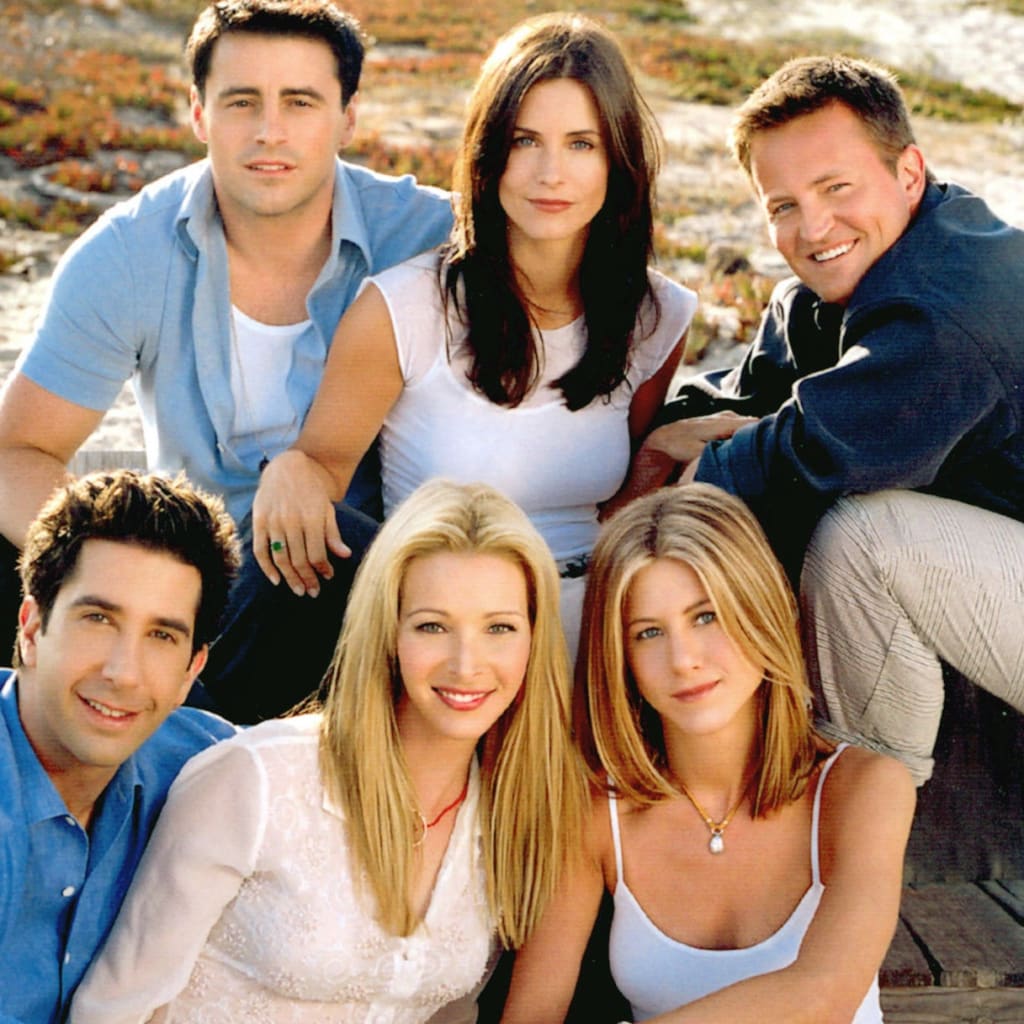
I was a huge fan, but for my friends who have never seen "Friends", I tell them not to bother. It had its time and place, but now it's a little cringe-worthy.
If you watched the show in the '90s and '00s, it's easy to forgive the slights. After all, we know these characters. We know their fears and desires; strengths and weaknesses; quirks and idiosyncrasies. So the fact that they may be a bit self-absorbed, rude, or judgmental is fine with us; we accept their humanity.
If you didn't watch the show, they aren't human as much as severely flawed characters desperately in need of therapy. It's not particularly funny, just sad.
A few years ago, in the spirit of the #MeToo movement and renewed social awareness, it became a fad to hate "Friends" and discuss all the insensitivity in the scripts. Chandler: homophobic; Rachel: narcissistic; Monica: neurotic; Joey: misogynistic. And the list went on.
But that's too black-and-white, also. Some of it is simply incorrect, while the rest is taken out of context or magnified.
Because, the truth is, five of these characters are victims, with little to no psychotherapy. Although that doesn't necessarily excuse their behavior, it absolutely explains it.
Ross: The Non-Victim
I'm not defending Ross. He's not a victim; he's terrible. He's also the only character to receive regular therapy (as a child). The actions he takes are completely his fault.
Chandler: Guarded, but not Homophobic
The argument that Chandler was homophobic bothered me the most. There are a few quips that could have been cut. (The "loose wrist" comment is a good example.)
And in one scene, Phoebe uses the term "homophobic" to describe one of Chandler's dry jokes, deepening this argument.
Yes, those, and several others, were in bad taste. I'm not arguing a perfect script.
However, the argument posed by critics usually isn't about Chandler's quips; it's about his difficult relationship with his father. So let's examine that.
Argument 1: Chandler hates his father because Charles is trans.
There are multiple problems with this logic. First, the show doesn't specify if his father is a trans woman, a cross-dresser, or identifies as a different gender. (Note: For the sake of inclusion, I'll use "they" as the pronoun for Charles.) The first time we meet Charles, they are singing in a (probably) gay bar, dressed as a woman. Earlier in the series, we discover that they were a member of a gay all-male burlesque show. In the scenes of the wedding, they dress as a woman. Thus, Charles is certainly not a cis male, but there's no clarity as to whether they're trans.
Second, even if Charles is trans, there's no proof that Chandler is transphobic. Yes, he didn't appreciate his father coming to his scout meetings dressed in feminine clothes, but that's because of the embarrassment he felt as a child, not his father's identity. In fact, Chandler participated in his father's performance of "It's Raining Men" as a teenager (which should be more alarming than the show made it seem). And despite a bit of awkwardness, he tells his father that they look beautiful at his wedding.
Argument 2: Chandler hates his father because Charles is gay.
There's no evidence that Chandler has issues with his father being gay. He talks about being angry that his parents divorced and that Charles wasn't very involved in his life. He even mentions hating the man Charles dated after the divorce. But again, those responses are due to being hurt, not because of Charles' sexuality.
Argument 3: The show (not character) is homophobic/transphobic.
That argument has more merit, especially thanks to snide remarks from Chandler's mother--who certainly has issues of her own--both about Charles' gender identity...
...and his sexuality:
(Also, portraying the "houseboy" as a servant with an unidentifiable accent was a poor choice for the show.)
The show giving Charles the name "Helena Handbasket" was crude, and it never specifies if Charles changed their name to Helena or if, as I assumed, that was simply their stage name. The first scene in which we meet them is the only scene in which their "new" name is used.
Additionally, choosing a straight cis woman (even if she is a gay icon) to play Charles was a mistake, and Kathleen Turner agrees.
Although it could be argued that the show had many progressive views on the LGBTQ+ community, it certainly made numerous errors in its portrayal of those characters.
Nevertheless, while the show may be biased, Chandler's character isn't. He's a guy who had a difficult childhood and never found a healthy coping strategy. Therapy, reconciliation, and standing up to his mother (again) would have helped the character grow.
Monica: Emotionally Abused and Neglected
Why do Monica's parents treat her so poorly? We never really receive an answer to that. In later seasons, her father claims that they didn't think Judy could have children, so Ross was "a medical marvel", somewhat explaining the favoritism. However, when talking about Ross' conception--the reason the couple married--they have a different story:
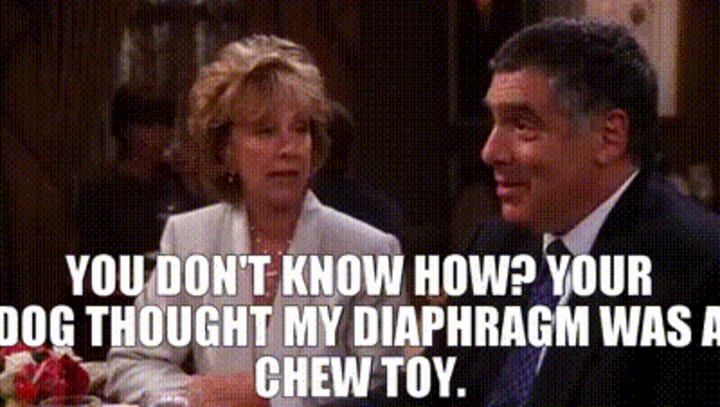
Both of those things can't be true.
Ross certainly had more accomplishments than his sister; his childhood bedroom is practically a shrine with trophies, awards, and science fair projects. However, it's never proven that Ross is smarter than Monica; only that he had more opportunities to demonstrate his talents.
Furthermore, severe overeating is a sign of psychological distress. Not only does Monica not receive therapy (unlike her brother), her parents encourage her unhealthy behavior.
And when she finally overcomes this poor coping skill and loses the weight, her mother is anything but supportive.
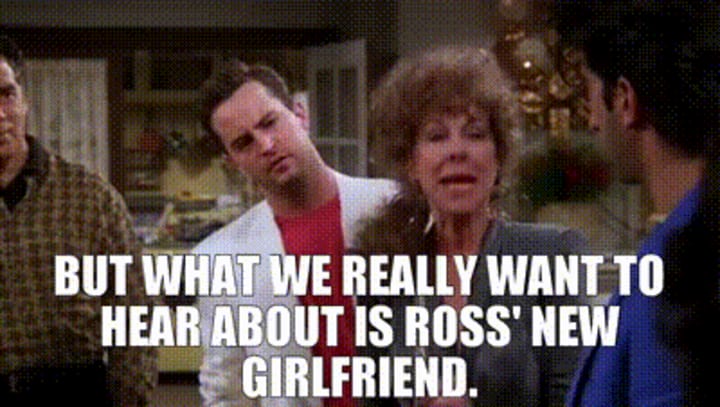
And why does Ross get to go to therapy?
A decent therapist could have discovered that this was due to jealousy and unhealthy sibling rivalry. A good therapist would have recommended family therapy. A great therapist would have confronted Monica's parents and helped Monica overcome these struggles.
Regardless, it's no contest: Jack is the better of the two parents.
And in the 7th season, he tries to apologize (read: assuage his guilt) by giving Monica his Porsche.
While some fans consider this "justice for Monica," the truth is that a shiny car--no matter how expensive--doesn't erase more than three decades of Jack's neglect and Judy's emotional abuse.
It's implied that Judy treats Monica poorly because that's how Judy was treated by her own mother. But that's not an excuse; it's a classic example of "the cycle of abuse".
Monica does exhibit some OCD symptoms. However, it should be noted that wanting things to be clean is not the same as obsessive compulsive disorder. Her cleanliness is a quirk and part of her personality, not a disorder.
The problematic symptoms are those related to the requirements of right angles and bedspread positions. After Richard makes the bed in the morning, she remakes it. Why? "Alright, you see these little flower blossoms? They should be facing up, not down, because, well, the head of the bed is where the sun would be." It's not just that the bedspread was wrong; it's that she felt compelled to fix it.
Although the mechanisms of OCD are still being researched, studies have shown a connection between childhood maltreatment and OCD, including changes in the brain. Therefore, it's possible that Judy's (and Jack's) poor parenting is part of the reason Monica is the most neurotic character on the show.
The character certainly has obnoxious (and sometimes amusing) moments of neurosis. But, ultimately, those behaviors are simply coping mechanisms for her internal struggles.
Rachel: Unhealthy Childhood and Poor Sexual Boundaries
One could argue that Rachel is by far the most privileged child in the group. In some ways, that makes her the easiest character to hate. On a superficial level, she has no reason to claim to be a victim.
However, her childhood was far from happy. Her sisters were at least as self-absorbed and selfish as she was. Her parents were in a loveless marriage and didn't set a healthy example for their children. Her father expects certain things from his children in exchange for his financial support. "Unconditional love" does not exist in this family.
How many sexual relationships Rachel had in high school and college is unclear, but she certainly didn't achieve her overwhelming popularity through her personality. When she's discussing her sexual partners with Ross, she only mentions a few guys, but other names emerge throughout the show. To make things more complicated, it's unknown what level of "fooling around" leads to a name being put on that list.
Regardless of the number of partners, she definitely wanted the approval of boys and the envy of girls. It becomes a recurring joke in the show, but it's also heavily judged by the characters and show's writers.
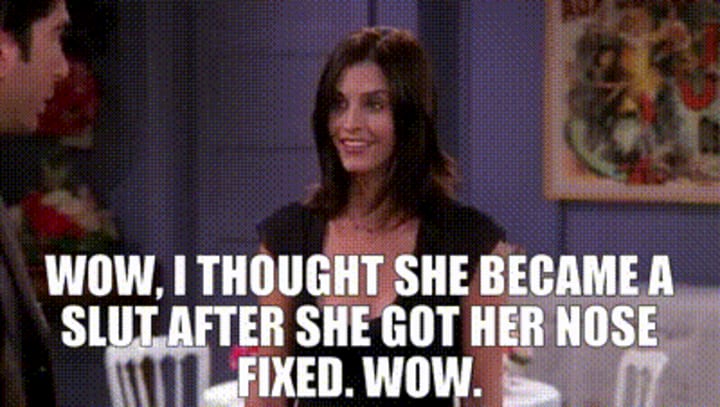
And, since we're discussing victim-blaming, it should be noted that "slut-shaming" isn't a good look, either. And it happens a lot.
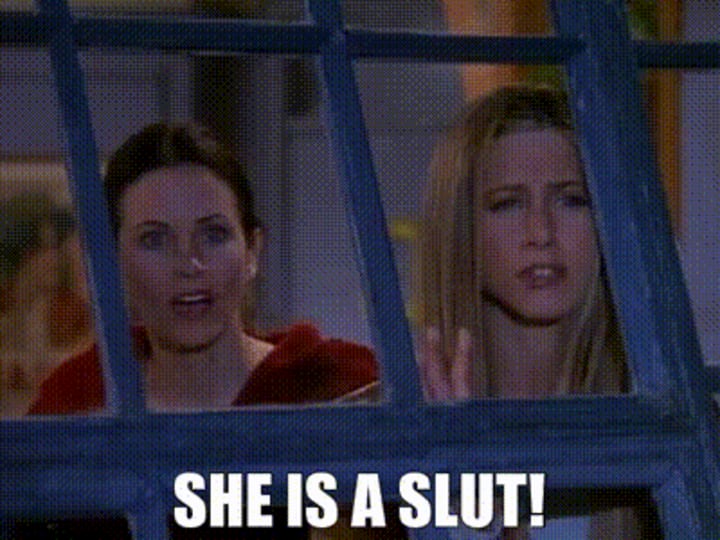
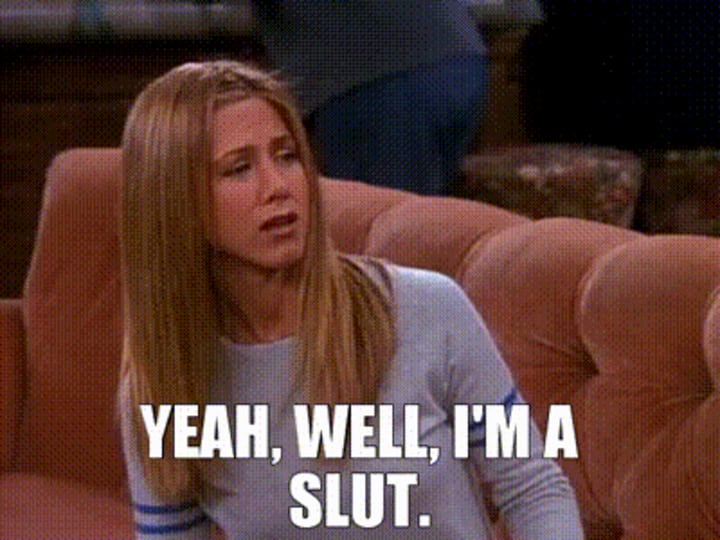
And the female characters are judged much more harshly than the men.
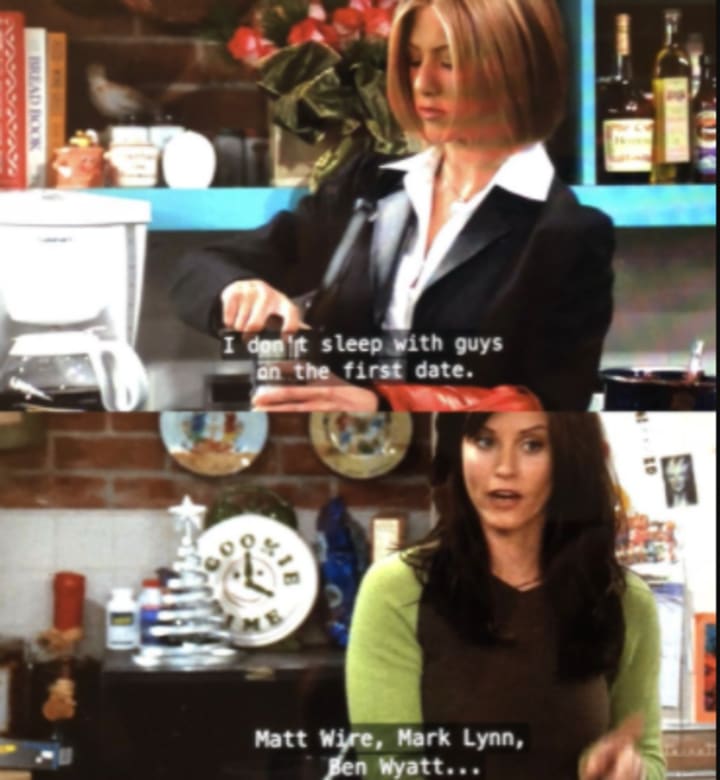
However, it could be argued that Rachel has the greatest character growth in the show. She goes from "never had a job" to accepting (and then likely declining) a career in Paris. She (mostly) becomes less shallow by dating men for more than money and good looks. She is a responsible parent and a great friend. She tries to help her sisters become better people and comforts her father after a heart attack.
Overall, she moves past her difficult childhood and her past questionable decisions to become a healthy, well-functioning adult.
Joey: Sexually Abused (Multiple Times)
It's easy to make a case for Joey being misogynistic with numerous sexual encounters. (Although the show never uses the word "slut" to describe him...) Yet, one of the most disturbing moments is in the first episode of Season 2, when we gain a look into Joey's childhood:
Joey struggles with this realization for at least the rest of the episode, obviously examining other moments of his life, too. Nothing more is said about this in the show, but it helps us understand his character.
Towards the end of Season 8, we get additional insight into his youth. After a cooking class in which he excels, he tells Monica: "Well I had a great time! Learned how to bake, ate great food, that’s the first 'A' I’ve gotten since seventh grade, and I didn’t have to sleep with the teacher this time."
In the state of New York, the "age of consent" is 17 years old, and it has been for decades. (In 1920, it was 18 years old.) Joey was likely in 7th grade around 1981. So, he didn't "sleep" with the teacher; he was raped by the teacher.
These difficult moments could explain why he still finds comfort in a child's stuffed penguin.
And as an adult, not only is he not abusive toward any of the women he dates, he is a victim of physical aggression in at least one of his relationships, although, again, the show makes light of it.
This is considered a joke to the characters. A man abused by a woman? That doesn't happen! Especially to a man's man!
Joey confronts Katie, gently explaining how he feels...
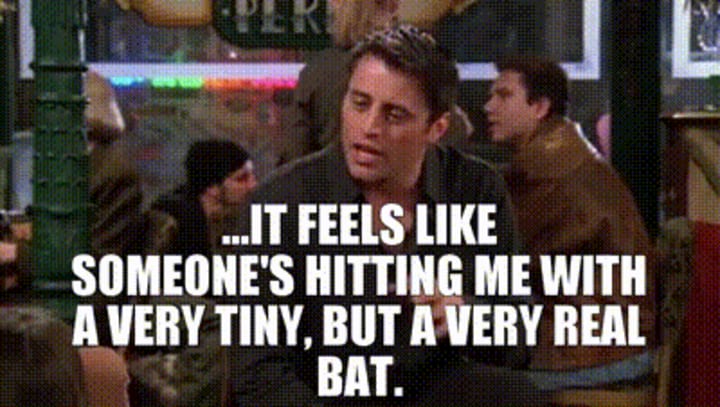
...only to be hit again. And the audience laughs.
Ultimately, Joey decides to end the relationship, despite the fear that Katie will become more aggressive at the news.
It's Rachel who eventually comes to Joey's defense (only after she, too, is assaulted).
Most television shows from that time have a Joey-like character: a stereotypical cis man who has a string of one-night stands. (Thank Quagmire from "Family Guy", Jesse from "Full House", Tony from "NCIS", and Todd from "Scrubs".) Some of these characters evolve; some don't. Joey is a bit of a mixed bag.
Joey does have some sleazy moments. He doesn't call women back after sleeping with them, and he may or may not have a collection of their underwear. He definitely cheated on Angela Delvecio, his longest relationship, multiple times. He's not a saint.
However, he is compassionate toward his sisters, their children, and his female friends. There is no indication that he coerces or manipulates the women he sleeps with, nor that he promises them a steady relationship. While it's easy to paint him as a predator, it may be that he and his dates simply enjoy sex and have a mutually-beneficial time.
With all of these pieces together, it appears that this character does (usually) respect women, but has questionable boundaries. Despite the machismo and egotistical nature, he doesn't have much self-confidence and makes up for it by doing the thing he's best at: sex.
Long-term therapy would have helped Joey come to terms with his abuse and create firmer boundaries. As it stands, Joey could be a better person, but this may be all of which he's capable during the show.
Phoebe: The Hardest Life Story
With every season, Phoebe's life story got progressively crazier. In the pilot episode, she tells us about moving to New York City...at 14...after her mother killed herself...
By the end of the series, we discover that "guy in van" was her first love.
And there are dozens, if not hundreds, of small anecdotes in between, making Phoebe's character complicated with a tumultuous childhood, violent adolescence, and verdictless early adulthood.
Her mother's suicide becomes a running joke in the show, which should really be more disturbing and dark than the show makes it out to be. In the first season, her most uplifting holiday song quickly turns into a story about finding her mother's dead body.
By the seventh season, the joke has become so cliché that Phoebe apologizes for its overuse (that day).
Most of her stories don't overlap; they simply build on one another. Examples include:
- Her biological father abandoning her and her twin sister (maybe twice? We never find out what happened after they "reconnect" at her grandmother's funeral.)
- Her biological mother giving her up for adoption (or abandoning her, depending on how you look at it)
- Her mother, a drug dealer, committing suicide
- Her stepfather going to prison (and later stabbing someone, ruining his chance to walk her down the aisle at her wedding)
- Living in such poverty that she "rode" the box which once contained her neighbor's bicycle, because there was a picture of the bike on the box
- Not being able to attend high school
- Being lied to about having a brother and who her grandfather actually was (not Albert Einstein)
- Being homeless, living in a cardboard box, covering herself with newspapers, and threatening people with a pipe during muggings in order to afford food
- And, in case you forgot, stabbing a police officer... after he stabbed her
Phoebe is quirky and atypical, but also, if she's honest, probably tormented. Her odd comments provide levity to the show, but nearly every story that she casually tells is dark. There are layers to most of those tales, which we never learn. To make matters worse, she is the least developed character, not receiving a solid story arc until the final two seasons.
The fact that she does mention her mother's suicide daily--and uses it to manipulate her friends--is a key sign that she hasn't resolved her feelings on that traumatic event. We may not hear about flashbacks or nightmares, but if we're betting on which character has the worst PTSD, Phoebe is where we should put our money.
And dating the terrible Freudian psychiatrist likely made her more hesitant to be open with a future therapist.
Does Being Victims Excuse Their Behavior?
Uh... well... no, not really. These characters are very human and they do make a slew of mistakes including adultery, lying, violence, threatening and manipulating people, and stealing, among others.
Terrible life circumstances don't excuse those actions.
However, they do explain most of them. Other than Ross, none of the characters have a developed sense of self, and therefore struggle with understanding themselves, communicating with others, setting healthy boundaries, and coping with past (and current) trauma.
No matter how many mistakes they make, we probably shouldn't expect more from them.
So is Hating "Friends" Victim-Blaming?
That depends.
If you're hating the actual writing and missteps of the showrunners, no. Despite being relatively progressive for the 1990s, the show's morals have not stood the test of time. There are plenty of lines that should have stayed on the cutting-room floor.
But if you're hating the characters and their actions, yes, probably so.
I understand why people argued that Chandler was homophobic and Joey was a predator; nevertheless, those accusations simply aren't true when viewed in context. These characters are far from flawless, but they aren't evil either. And overlooking their deep scars from neglect, abuse, and terrifying life circumstances is naive, bordering on contemptible.
Maybe we shouldn't expect empathy for sitcom characters who have been off the air for nearly 20 years.
Then again, maybe we should.
After all, the world can always use more compassion.
About the Creator
Alex Casey
I'm a full-time educator and part-time writer. My best ideas usually end up on Vocal.






Comments
Alex Casey is not accepting comments at the moment
Want to show your support? Send them a one-off tip.